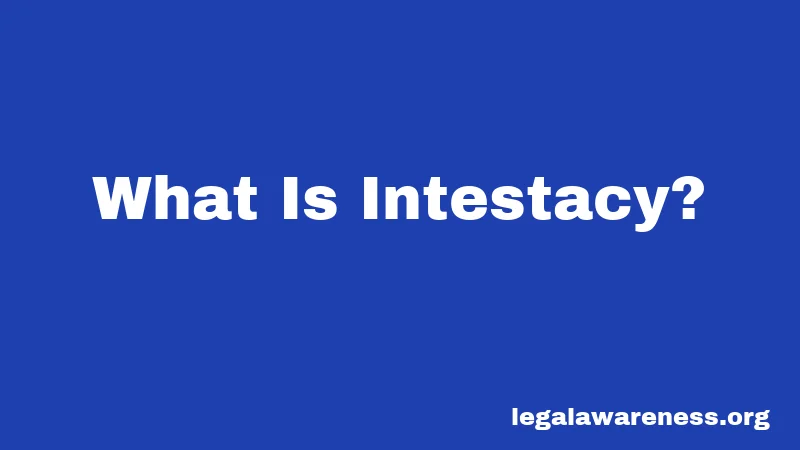Florida Intestacy Laws in 2026: When Death Creates a Default Will
Most people have no idea what happens to their stuff if they die without a will. Seriously. But in Florida, the state has an answer. It’s called intestacy law, and it basically kicks in and divides your estate like a default will.
Here’s the thing: even if you never write a will, Florida law decides who gets what. The question is whether they’re getting it the way you’d want.
What Is Intestacy?

Okay, pause. Read this carefully. Intestacy happens when someone dies without a valid will. When that occurs, their assets don’t just sit there. Instead, the state’s intestacy laws come into effect, determining who inherits property based on your family situation at the time of your death.
Think of it like a traffic ticket, but for your entire estate. The state has a system. They follow it. Your family either benefits or gets surprised.
The key word here? Control. Without a will, the State of Florida basically provides the deceased with a Will through intestacy laws, but this takes control away from the deceased and distributes the estate according to a certain formula.
You’re probably thinking: “That sounds fine. Does it really matter?” Yep. It does.
The Inheritance Order in Florida
Florida has a specific order for who inherits. It’s called the line of succession. Let’s walk through it.
If You Have a Spouse and No Children
Your spouse gets everything. Seriously. If there is a surviving spouse and no descendants, the entire estate goes to the surviving spouse. It’s straightforward.
But wait—common-law marriages don’t count. Florida doesn’t recognize common-law marriages, so long-term partners don’t have inheritance rights under intestacy law. That can be brutal for couples who never officially married.
If You Have a Spouse and Children (All with That Spouse)
Again, your spouse inherits everything. This protects the surviving parent’s ability to care for your shared kids. Pretty straightforward, right?
If You Have a Spouse and Children from Different Relationships
Now it gets more complicated. Your spouse gets half. Your children from other relationships share the other half. This is where families sometimes struggle, honestly.
Wondering if this applies to you? It might. If you’ve been married multiple times and have kids from those relationships, this rule affects you directly.
If You Have No Spouse (Just Children or Other Family)
Your children inherit everything, divided equally among them. If you have no children, your estate passes to your parents. If they’re gone, your siblings get it. The rules keep working down the family tree.
If the deceased had no spouse or children, an inheritance may be passed on to surviving parents, then siblings. If there are neither parents nor siblings, the inheritance may pass to distant relatives according to the intestacy laws.
Important Details About Who Counts as an Heir

Here’s where things get important. You’re not alone—this confuses a lot of people.
Adopted Children
Adopted children inherit just like biological children. Adopted children have the same inheritance rights as biological children. However, children you’ve placed for adoption are not considered your heirs under intestacy law, because the legal relationship is severed upon adoption.
That second part? It’s crucial. If you placed a child for adoption, they have no claim to your estate. Even if you feel connected to them.
Stepchildren and Foster Children
Here’s the hard truth: stepchildren and foster children don’t automatically inherit, even if you raised them. Stepchildren who haven’t been legally adopted don’t have inheritance rights under intestacy law, even if you’ve raised the stepchild from a young age and consider them your own.
To fix this, you need a will. Not a text message. Not a verbal promise. A real, legal will that names them.
Half-Siblings
Half-siblings do inherit. So do full siblings. They’re treated equally under Florida law.
Posthumous Children
This one’s interesting. If a child is conceived before you die but born after, they inherit. Posthumous children—those conceived before but born after a parent’s death—have the same inheritance rights as children born during the parent’s lifetime, as long as they’re born within 36 weeks of the parent’s death.
Homestead Property: Special Rules Apply
Hold on, this part is really important. Homestead property—that’s your primary residence—has completely different rules.
If You Have a Surviving Spouse and No Minor Children
Your spouse inherits the whole house. Boom. They own it free and clear of creditors’ claims. But here’s what they can do: they can choose to either own the house outright, or take a life estate plus half ownership while children get the other half.
If You Have a Spouse and Minor Children
This gets interesting. Your spouse doesn’t automatically own the house. Instead, they get a “life estate.” That means they can live there for the rest of their life. When they pass away, the children inherit it.
Or—your spouse can choose a different option. They can take a 50% ownership stake as a tenant in common, with the minor children owning the other 50%. This gives the spouse more control but also shared ownership.
If there is a surviving spouse and other children not of the marriage, the spouse can take a life estate in the homestead, with a remainder to the descendants at the time of the decedent’s death. Another option is for the surviving spouse to elect to receive an undivided one-half interest in the homestead as a tenant in common.
If You Have No Spouse and No Minor Children
In this case, you can technically leave your homestead to anyone through a will. If you don’t have a will, Florida’s intestacy rules apply just like with other property.
But actually, here’s the thing—if you leave it to someone outside your legal heirs, they lose the homestead protections. So it’s risky.
What About Creditors?
Sound complicated? It’s actually not. Homestead property is protected from creditors. But—and this is important—mortgages, property taxes, and mechanics’ liens can still be claimed against it.
What About Other Property?

Non-homestead property works differently. Only assets that pass through probate are affected by intestate succession laws. Many valuable assets don’t go through probate, and therefore aren’t affected by intestacy laws.
For example, if you have a bank account with a “payable-on-death” designation, that goes directly to whoever you named. It skips probate entirely. Same with life insurance policies that name a beneficiary.
Vehicles, household furniture, and personal items are also protected under Florida law. These assets don’t go to creditors before family members get their share.
What if There Are No Relatives?
Okay, so what if you truly have no family? No spouse, no kids, no parents, no siblings, no aunts or uncles, nothing?
Florida law actually tries really hard not to let this happen. The laws are designed to get your property to anyone who was even remotely related to you, including distant relatives. Property rarely goes to the state if you leave a spouse, children, siblings, parents, grandparents, aunts or uncles, great uncles or aunts, nieces or nephews, cousins of any degree, or the children, parents, or siblings of a spouse who dies before you.
If absolutely no relatives exist? Then the estate goes to Florida. It’s called “escheat.” It literally never happens in real life.
The Probate Process Without a Will
Not sure what counts as a violation? Let me break it down. When you die without a will, someone has to handle the paperwork. That someone is called a personal representative.
Filing the petition for administration comes first. Any eligible family member can petition the court to act as the representative, although Florida law grants priority to certain relatives, such as a surviving spouse or adult children.
Here’s what happens next:
The court appoints a personal representative to handle your estate. They identify all your assets and debts. They pay what you owed—taxes, medical bills, creditor claims. Finally, they distribute what’s left to your heirs.
This process takes time. Usually several months. Sometimes longer if there are disputes.
Can You Skip These Rules?
Absolutely. That’s the whole point of having a will or trust.
Honestly, this is the part most people miss. You can say exactly who gets what. You can leave money to charities. You can give your car to a friend. You can set up trusts for your grandkids’ education.
But you have to do it legally. A text message to your family doesn’t count. A voice memo doesn’t count. Only a properly signed will or trust has legal weight.
Confused about the difference? Let me break it down. A will goes through probate. A revocable living trust avoids probate. Both let you control who gets what.
Half-Relatives and Special Cases
Here’s something interesting. Half relatives—those who share only one parent with you—inherit only half as much as whole relatives.
So if you have a full sibling and a half sibling, the full sibling gets more. It’s an old law, but Florida keeps it.
What about immigration status? Don’t worry. Relatives entitled to an intestate share of your property will inherit whether or not they are citizens or legally in the United States.
Elective Share Rights
Wait, it gets better. Even if a will tries to completely cut out a spouse, Florida law doesn’t allow it.
A surviving spouse has the right to claim an “elective share.” This is generally 30% of the estate, regardless of what the will says. It’s a protection built into Florida law.
This is one reason married couples should definitely plan their estates. A prenuptial or postnuptial agreement can change these rules. But without one, the state protects the surviving spouse.
How Long Does This Take?
Time is important here. The probate process without a will takes time. Usually 6 to 12 months for an uncontested estate.
If family members disagree about who should be the personal representative, or if there are creditor disputes, it can take much longer.
There’s a faster option, though. Summary administration is available if the estate is smaller than $75,000 and debts are minimal. This can wrap up in a few months.
Examples That Help
I looked this up recently. The rules surprised me. They might surprise you too.
Example 1: Sarah dies with a spouse and two adult children from previous relationships. Her spouse inherits half the estate. The two children split the other half equally. This happens automatically under Florida law, even if Sarah’s will said something different (assuming the will is invalid).
Example 2: James dies with a spouse and a house (homestead). His spouse gets a life estate in the house. She can live there forever, but she doesn’t own it. When she dies, the house goes to their biological children.
Example 3: Maria dies with no spouse, no children, but she has parents and siblings. Her parents inherit first. If her parents are also deceased, her siblings and their descendants split the estate.
Frequently Asked Questions
Does Florida recognize common-law marriage for inheritance? No. Only legal, official marriages count. Long-term partners have no inheritance rights under intestacy law unless married.
Can I override intestacy laws with a will? Yes, absolutely. A valid will lets you control who gets what. But it must be properly signed and witnessed.
What if I want to leave money to someone who isn’t family? You need a will. Intestacy laws only recognize family members and spouses.
Does homestead property go through probate? Technically yes, but it’s treated differently. Homestead is protected from creditors and certain procedures are streamlined.
How do I know if my property qualifies as homestead? Your primary residence within city limits (half acre or less) qualifies. If you move to assisted living, the status becomes complicated. Consult a lawyer.
What if I don’t want my stepchild to inherit, but I do want my adopted child to? Adopted children inherit like biological children. Stepchildren don’t inherit unless legally adopted or named in a will.
Do I need a lawyer to make a will in Florida? Not legally required, but highly recommended. A DIY will might be invalid, which puts you back in intestacy.
What happens to joint accounts when I die? If titled as joint with rights of survivorship, they pass directly to the co-owner and skip probate.
Final Thoughts
Okay, here’s the honest truth. Florida’s intestacy laws work for many families. They prioritize spouses and children. They protect homestead property. They eventually distribute assets to even distant relatives.
But they don’t work for everyone. If you have blended families, unmarried partners, or specific wishes about who gets what, you need a plan. A real plan. A written, legally valid plan.
Now you know the basics. Stay informed, stay safe, and seriously—when in doubt, look it up or ask a lawyer. Your family will thank you.
References
Florida Probate Code Chapter 732 – Intestate Succession
Florida Supreme Court: Probate and Succession Rules
Florida Homestead Law and Intestacy Guide
